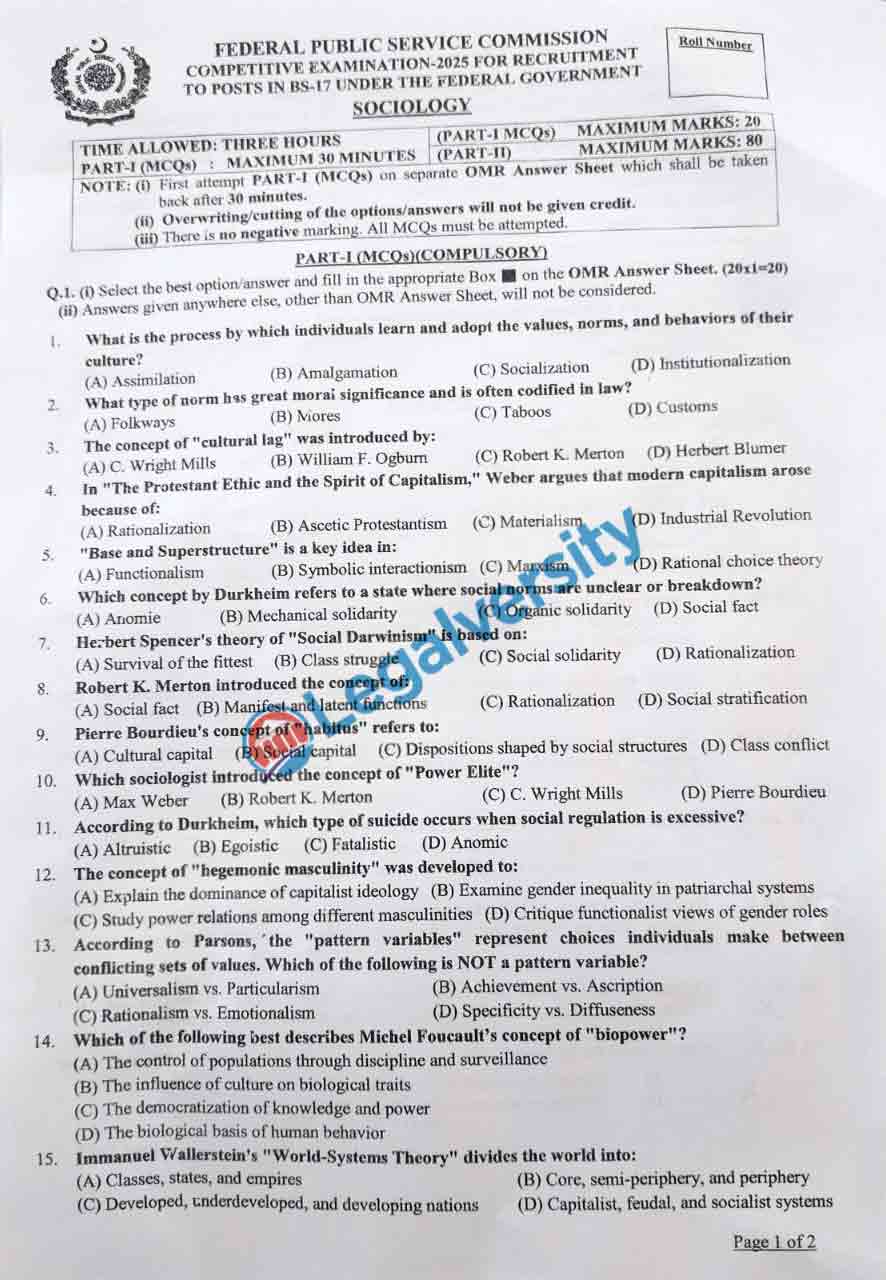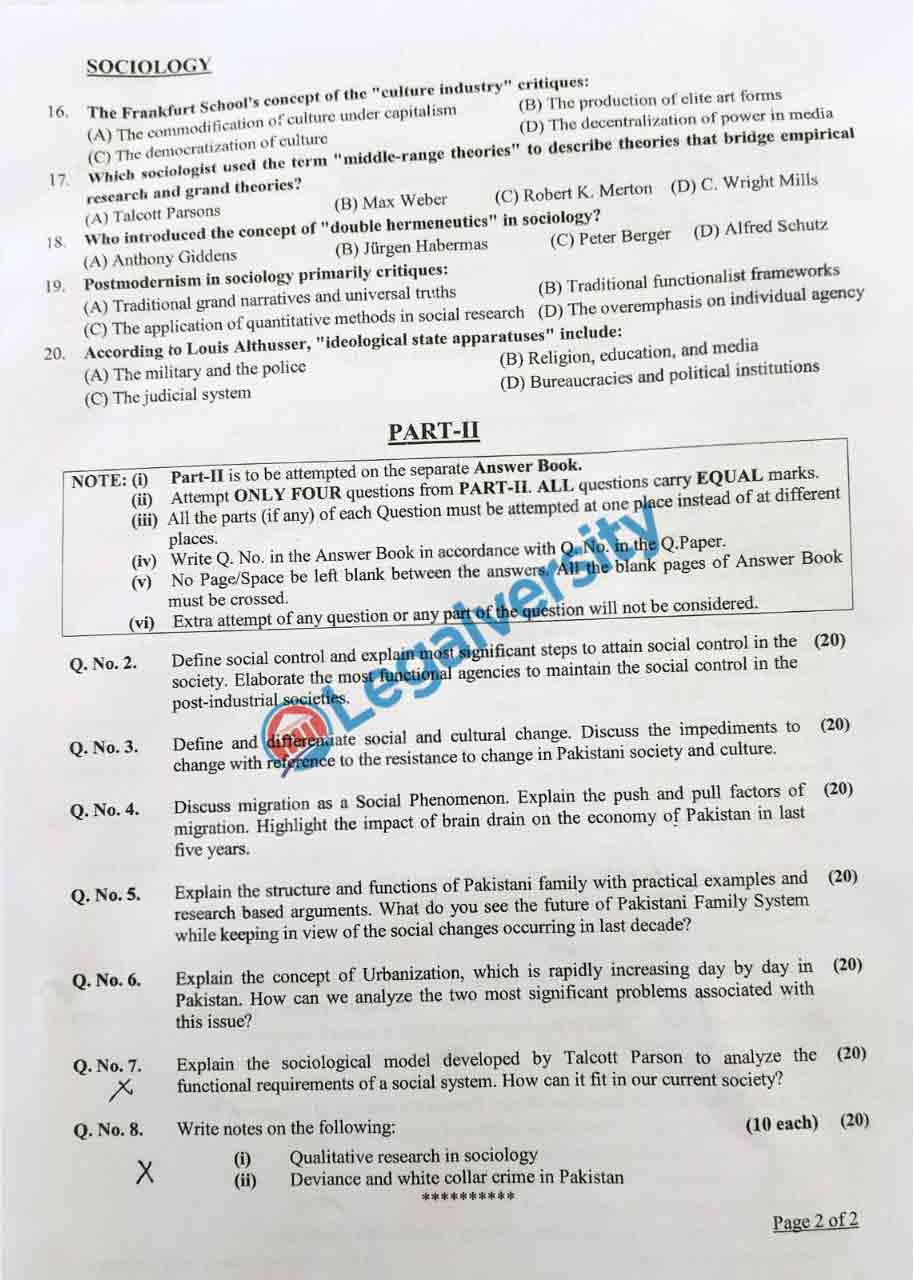Sociology is an optional subject in the CSS competitive examination 2025. Here, you will find the CSS Sociology past Paper 2025. I will also provide a summary of the paper, in which you will analyze what topics were given and how difficult they were. This lets you better understand the paper and prepare well for future examinations.
CSS Sociology Past Paper 2025
Q1. Define social control and explain the most significant steps to attain social control in society. Elaborate on the most functional agencies to maintain social control in post-industrial societies.
Q2. Define and differentiate social and cultural change. Discuss the impediments to change with reference to the resistance to change in Pakistani society and culture.
Q3. Discuss migration as a social Phenomenon. Explain the push and pull factors of migration. Highlight the impact of brain drain on the economy of Pakistan in the last five years.
Q4. Explain the structure and functions of Pakistani families with practical examples and research-based arguments. What do you see as the future of the Pakistani Family system while keeping in view of the social changes occurring in the last decade?
Q5. Explain the concept of Urbanization, which is rapidly increasing day by day in Pakistan. How can we analyze the two most significant problems associated with the issue?
Q6. Explain the sociological model developed by Talcott Parson to analyze the functional requirements of a social system. How can it fit in our current society?
Q7. Write notes on the following:
- Qualitative research in sociology
- Deviance and white collar crime in Pakistan
Critical Analysis of the Paper
Social control refers to the mechanisms, strategies, and institutions by which societies try to order and regulate behavior. The most significant actions to attain social control are the enforcement of laws, promoting education, strengthening moral values, and developing community involvement. Functional institutions such as legal institutions, mass media, educational systems, and religious institutions play a central role in maintaining social control in post-industrial societies by expressing public opinion and attaining conformity to social norms.
Social change refers to alterations in social systems, groups, and activities, whereas cultural change refers to alterations in ideas, values, and traditions. Individuals in Pakistani society are not receptive to change due to long-established traditions, religious beliefs, political issues, and economic disparity. This can be observed in gender roles, family, and how individuals embrace new technologies, and it makes it difficult for growth to occur.
Migration is a complex social problem influenced by economic, political, and social factors. Push factors such as the lack of employment, political issues, and security issues compel individuals to migrate out of their native country, and pull factors such as improved job opportunities, improved income, and improved living conditions attract them to other regions. Brain drain in Pakistan negatively impacts the economy since skilled individuals emigrate to better opportunities overseas. The impact has led to the lack of skilled workers, particularly in the health and IT sectors, with negative implications on the development of the country. The Pakistani family is generally large and has a lot of relatives. Families are important in imparting values, providing money, and providing emotional support. Over the last few years, urbanization, financial issues, and women gaining power have reduced families to smaller sizes. In the coming years, Pakistani families might continue to evolve, prioritizing individual freedom while holding on to traditional values.
Urbanization in Pakistan is developing very rapidly as people are relocating from villages to cities and the population is increasing. The rapid development has created serious issues, primarily shortages of housing and poor city infrastructure. Overcrowded cities, unhygienic conditions, and higher unemployment contribute to urban poverty and slum development, which require city planning and governmental reforms.
Talcott Parsons came up with a sociological model known as the AGIL model. The model explains what the social system must have to operate effectively: Adaptation, Goal Attainment, Integration, and Latency. This model applies to Pakistani society in that adaptation occurs in economic transformation, goal attainment in political administration, integration in religious and cultural coexistence, and latency involves sustaining social values. Pakistan also has governance challenges that make it difficult to apply this model to the fullest.
Sociological qualitative research attempts to explain human behavior and social phenomena from non-quantitative data like interviews, observations, and case studies. It generates more elaborate descriptions of social interactions and cultural patterns.
Deviance and white-collar crime in Pakistan are on the increase. Money laundering, corruption, and cybercrime are becoming more frequent. White-collar crimes hardly get punished because the legal system is weak and political influences are at play. This has a bearing on the economy and institutions’ credibility.
View the CSS Sociology Past Paper 2025


Also read:
